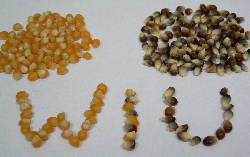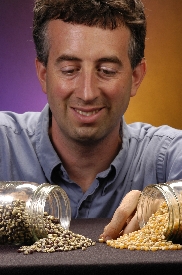University News
WIU Organic Research Farm Pops with New Crop
June 5, 2007
MACOMB, IL -- Western Illinois University's school pride will be knee high by the Fourth of July.
Organic popcorn, in shades of WIU purple and gold, will be planted within the next few week's on the agriculture department's pesticide-free organic Allison Research and Demonstration Farm, located north of Sciota.
According to Joel Gruver, WIU agriculture assistant professor and director of the Allison Farm, the one-acre of organic popcorn, is likely to produce more than 3,000 pounds of kernels. The WIU organic popcorn will be harvested in late September or early October, and dried in mesh bags at the University's farm on Ember Road, north of the WIU-Macomb campus. It will be ready for popping by Halloween, Gruver estimated.
"While most of our crops aren't sold to the general public, the agriculture department's student organizations plan to sell the organic purple and gold popcorn as part of the clubs' fundraisers," Gruver said. "We're really hoping to connect to the WIU and Macomb communities with this unique product."
So what's the difference between organic popcorn kernels versus "traditional" popcorn kernels?
Air …. and taste.
"Most of the popcorn available for purchase today has a very high expansion ratio (more than 40) which means that popped kernels are mostly air. This translates to less flavor," he explained. "Many organic farmers choose to grow varieties with lower ratios, which means they have a more robust corn flavor."
While the consumer will pay more in the store for organic popcorn, Gruver believes the taste is well worth the extra money. He recently conducted a taste test with his students to compare the organic brand, "K & K Tiny but Mighty," against the cheapest store brand. Most of his students tasted a difference, Gruver said.
More flavor is a bonus for consumers, but what about the benefits for the producer who chooses to grown organic popcorn?
"One benefit for producers is that the nutrient requirements for this popcorn are lower than dent corn; therefore, it's easier to meet the plant's nutrient needs," Gruver pointed out. "Organic producers also have more flexibility. For instance, a producer who grows traditional crops may only be able to plant two crops, such as dent corn or feed grade soybeans. Organic grain producers in Illinois have more profitable options, including popcorn, for crop rotations."
The WIU Allison Farm grows primarily corn, soybeans and wheat, but Gruver said that he is interested in experimenting with other organically grown crops. The farm will serve as home to three new organic crops this summer: pumpkins, cantaloupes and watermelon. Gruver is already in the talking phase with WIU's food service provider, Sodexo, about using these organic products in campus dining rooms in conjunction with environmental awareness programs. The farm's "traditional" crops are sold mostly to Clarkson Grain in Beardstown (IL), which is a licensed organic grain merchant.
The Allison Farm's crops will be the focus of the annual field day, which will be held from noon-4 p.m. Wednesday, Aug. 8. Numerous organic farmers will be on hand to share their expertise, including Gene Mealhow, who produces and markets "K & K Tiny but Mighty" organic popcorn.
"Organic products tend to cost more than traditional products because they are specialty products," Gruver said. "Specialty products have more value for both consumers and producers."
For more information on WIU's organic farm research, contact Gruver at 309/298-1215 or J-Gruver@wiu.edu.
Posted By: Darcie Shinberger (U-Communications@wiu.edu)
Office of University Communications & Marketing



Connect with us: